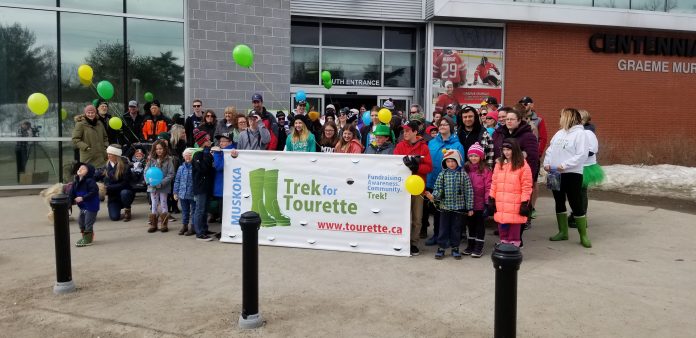Due to the COVID-19 pandemic, Tourette Canada has reworked its annual walkathon to be a virtual event with participants finding alternative ways to complete their trek, such as walking in their neighbourhoods, riding a bike or a pony, or other creative ways to raise awareness and support for the cause.
The Trek for Tourette, originally scheduled for March 29, is typically held in March because it’s a month of unpredictable weather, which mirrors the unpredictability of Tourette syndrome (TS). TS is a neurological disorder characterized by involuntary movements or sounds known as tics. Groups across the country come together each year for a 5-kilometre walk to raise money and awareness for TS, whether it’s sunny, snowing or raining. Shawn Forth, trek coordinator for the Muskoka chapter of Tourette Canada, said that organizers knew they’d have to hold off on the event when quarantining began in March. For a while, they weren’t sure if they’d be able to hold the event at all, but with the virtual event now planned for May 31, the trek will go on.
“This year, because we’ve had to move the trek by two months, we are very much still in the spirit of working under conditions that are very unpredictable,” Forth said. “The challenges change each day, so that’s why this year, it’s still very much in the spirit of the trek.”
While the event usually sees groups walking together en masse, this year trekkers will perform a variety of activities as they participate in the trek individually or with their households. Participants are being asked to share their trek experience through Instagram, Twitter and Facebook with the hashtag #UntraditionalTrek. Even with the limitations of the pandemic, the event will be held in Muskoka, Simcoe County, Ottawa, London and other locations across Ontario and the rest of Canada.

Forth said organizers started to realize how different the quarantine looked for Canadians in different communities across the country, so whether it’s running on a treadmill, climbing stairs or walking the dog, Tourette Canada is encouraging people to participate however they can while remaining safe.
“It really is about doing what you can within the situation to help spread the awareness,” Forth said. “For some people, it may look like walking around their property for an hour, otherwise it might be biking or hiking or whatever they can do safely while social distancing.”
Especially with the current financial situation many people are facing, Forth said raising awareness remains his ultimate priority with the trek. Dispelling misinformation surrounding TS is an important part of fostering better understanding of the disorder, he said.
For example, only about 10 per cent of cases have coprolalia, the swearing part of the disorder, but more than 80 per cent have a co-occurring disorder such as obsessive compulsive disorder (OCD) or attention deficit hyperactivity disorder (ADHD). There’s also the public perception that the disorder is more rare than current research suggests, Forth said.
“What a lot of people don’t realize is the current research in the last five years has been showing Tourette syndrome happens in as many as one in 100 people, so 1 per cent of the population, based on the research, could be diagnosed with Tourette syndrome,” he said. “It’s no longer the disorder that it was when I was diagnosed [where] one in 5,000 were thought to have the disorder.”

Along with bringing awareness to those unfamiliar with the disorder, the trek also plays an important role in fostering community for those who know the disorder well. Forth said the local branch of the organization does offer a monthly support group, but usually only four or five families at most take part in each session. The trek typically offers families the chance to gather with 70 to 80 people, helping build a bigger, broader sense of community.
“It’s really important for the families who have someone diagnosed with Tourette syndrome because they get a lot of support from meeting up with other families during the trek,” Forth said. “The biggest challenge for us is really about finding a way for us to gather while still following all the social distancing protocols, and being able to give that support from one family to another.”
Organizers are relying on the #UntraditionalTrek hashtag along with sharing, commenting on and reposting content to help foster community during the virtual event. Anyone can take part in the event by registering online, but even if they don’t join in the fundraising, Forth said people can help broaden the public understanding of TS by sharing and commenting on social media posts during the trek.
“I’m really optimistic that we’re going to be getting a lot of social media posts,” Forth said, adding that Muskoka is set up well for the virtual trek because they are one of the local affiliates across Canada that are more active on social media. “A lot of people sort of are consumers of the media, and now we’re trying to get them to produce it as well to try to help build that sense of community.”
To participate in the Trek for Tourette or to donate to Tourette Canada, go to the Tourette Canada website for details. For local participants, be sure to use the hashtag #UntraditionalTrek and tag @TouretteMuskoka when sharing your experience on May 31.









